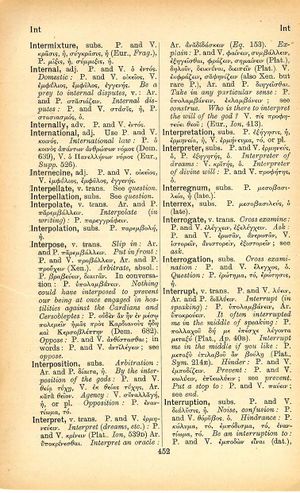interregnum
Νέµουσι δ' οἴκους καὶ τὰ ναυστολούµενα ἔσω δόµων σῴζουσιν, οὐδ' ἐρηµίᾳ γυναικὸς οἶκος εὐπινὴς οὐδ' ὄλβιος → They manage households, and save what is brought by sea within the home, and no house deprived of a woman can be tidy and prosperous
English > Greek (Woodhouse)
subs.
P. μεσοβασιλεία, ἡ (late.).
Latin > English (Lewis & Short)
inter-regnum: i, n.,
I the time between the death of one king and the election of another, an interregnum: populus flagitare regem non destitit; cum . . . illi principes novam interregni ineundi rationem excogitaverunt, Cic. Rep. 2, 12, 23: id ab re, quod nunc quoque tenet nomen, interregnum appellatum, Liv. 1, 17.—
II Transf., under the republic, the time between the death or departure of the consuls and the choice of new ones: res ad interregnum venit, Cic. Att. 9, 9, 3: rem adduci ad interregnum, id. ib. 7, 9, 2: per interregnum renovare auspicia, Liv. 5, 31, 7: interregnum inire, to become interrex, id. 3, 8.
Latin > French (Gaffiot 2016)
interrēgnum,¹¹ ī, n., interrègne, temps qui s’écoule entre deux règnes : Cic. Rep. 2, 23 || sous la républ., temps qui s’écoule entre la sortie de charge des consuls et l’élection de leurs successeurs : Cic. Att. 9, 9, 3 ; Q. 3, 2, 3 ; Liv. 5, 31, 7.

